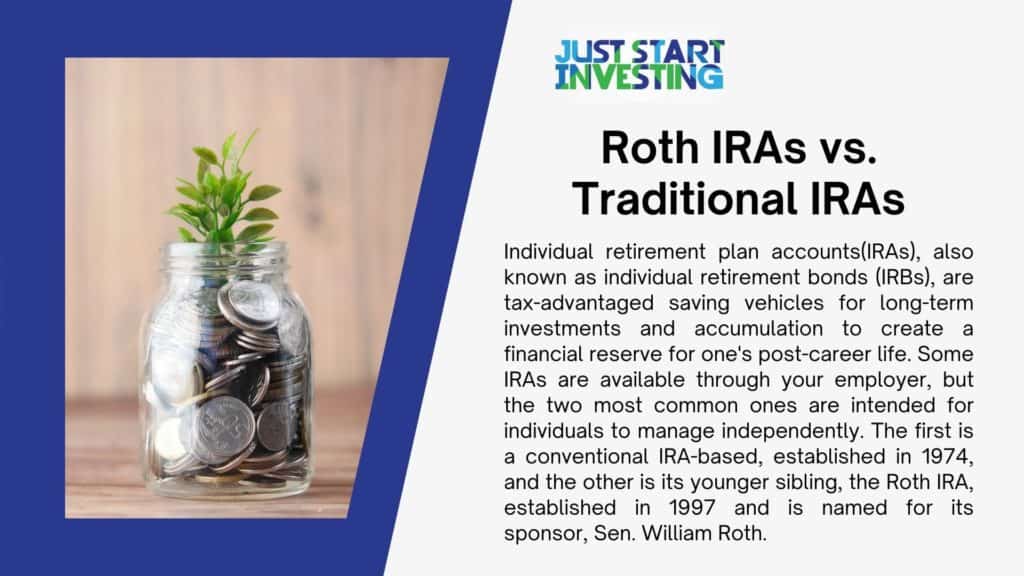A Roth IRA is an excellent method to save for your retirement years. Unlike a traditional IRA, this retirement account allows your assets to grow tax-free. You can also withdraw your contributions (but not earnings) tax-free.
Roth IRAs also allow tax-free withdrawals of earnings in certain situations taxed in traditional IRA contributions. These are just a few examples of first-time homebuyers’ hurdles that must be overcome. One of them is reaching age 59½, being disabled, or using the money as a first-time buyer.
Roth IRAs vs. Traditional IRAs
Individual retirement plan accounts(IRAs), also known as individual retirement bonds (IRBs), are tax-advantaged saving vehicles for long-term investments and accumulation to create a financial reserve for one’s post-career life. Some IRAs are available through your employer, but the two most common ones are intended for individuals to manage independently. The first is a conventional IRA-based, established in 1974, and the other is its younger sibling, the Roth IRA, established in 1997 and is named for its sponsor, Sen. William Roth.
Is your income OK for a Roth IRA?
Even though it’s a Roth IRA, some regulations exist for other tax-advantaged retirement plans. In addition, the IRS has specific rules regarding Roth IRAs. These rules apply to contribution limits, income restrictions, and how you can withdraw your funds.
Roth IRA Eligibility
- You may work for someone else and be paid. This covers commissions, gratuities, bonuses, and taxable fringe benefits.
- You’re a business owner, farmer, or have other compensated earnings considered earned income for Roth IRA contribution limits. Untaxed combat pay, military differential pay, and taxed alimony are among the benefits they will receive.
Roth IRA contribution limits are not limited by age or a maximum amount. So, for example, a summer job for teenagers might help them set up and manage a Roth IRA. (If they’re underage, it may have to be a custodial account.) An employed person in their 70s, on the other hand, may continue a Roth IRA contribution.
Roth IRA Income Limits
Overall income is a factor in determining whether or not you may contribute to a Roth IRA. The IRS has established income parameters that limit high-earning individuals. Your MAGI and filing status determines the income requirements. The MAGI is defined as adding a partial deduction for student loan interest, self-employed taxes, and higher education expenses to your tax return’s AGI.
If you are single and your MAGI is less than $125,000 (or $198,000 for a married and filing jointly), you can contribute the entire amount in 2021. The maximum amount you can contribute drops as your MAGI rises if you earn more. You won’t be able to contribute anything if your MAGI is above $140,000 (or $208,000 for married filing jointly together).

Roth IRA Savings Tips
Saving for retirement is a sound financial plan regardless of age or profession. Everyone will one day retire of their own accord or because of necessity. So whether you’re on track for retirement savings or need to catch up, or are a financial advisor wanting to give your customers a leg up when planning for their later years, these eight essential retirement savings ideas will help you put more money in your account.
What are the Roth IRA rules?
- You may withdraw your original contributions without paying taxes or penalties, regardless of how long your account has been open. That’s because you already spent income tax year on your money.
- The IRS always assumes that your original contributions come first when you withdraw cash from Roth IRA contribution limits.
- If you withdraw investment income earnings from your IRA, they are tax-free. But the IRS may want a piece of those returns, in the form of taxes and a possible penalty, if you withdraw early or otherwise don’t follow the guidelines for a qualified withdrawal.
- People who are at least 59½ years old and have maintained their accounts for at least a five-year holding period can take distributions, including earnings, without paying federal taxes.
Who is eligible to contribute to a Roth IRA
A Roth IRA is open to any taxpayer who has earned income, as long As they fulfill specific requirements regarding filing status and modified adjusted gross income (MAGI). Those with an annual higher income than a specified threshold, which the IRS changes from time to time, cannot contribute.
When can you no longer contribute to a Roth IRA?
Roth IRA contributions are not limited by age or quantity. So, for example, Roth IRA can be established and funded by a teenager with a summer job. (If they’re under 18, it may have to be a custodial account.) An employed individual in their 70s, on the other hand, can continue to contribute to a Roth IRA.
Amount of Roth IRA contributions you can make this year
If you are under 50, you can contribute $6,000 to your 2022 Roth IRA. If you are age 50 or older, the maximum contribution limit is $7,000. Finally, your MAGI determines how much you can contribute. So, if you made less than $6,000 (or $7,000 for individuals over age 50 or older), your maximum Roth IRA year’s contribution in 2022 would be restricted to 100% of your earnings.
Roth IRA rules for withdrawals
Open a Roth IRA and benefit from tax-free earnings as you save for retirement. Traditionally, a Roth IRA is different from other IRAs in that automatic contributions are not tax-deductible. Still, revenues may accumulate tax-free, and withdrawals are free of taxes and penalties. The rules for taking out a Roth IRA withdrawal and the penalties that may apply to vary based on your age and how long you’ve had the account. To avoid a 10% early withdrawal penalty, follow these instructions before making a Roth IRA withdrawal:
- After age 59½, withdrawals are required.
- After a five-year possession, withdrawals are needed.
- There are several exceptions to the early-withdrawal penalty, including first-time head of household income acquisition, college fees, and birth or adoption costs.
Age 59 and under
You can withdraw your Roth IRA contributions tax and penalty-free. However, you may be required to pay taxes and fees on Roth IRA earnings.
Withdrawals from a Roth IRA that you’ve had less than five years.
The tax and penalties incurred in taking a distribution from a Roth IRA before you reach age 59½ and the account is five years old are severe. In the following cases, you may be able to avoid penalties (but not taxes):
- You use the withdrawal (up to a $ 10,000-lifetime maximum Roth ira contribution) to pay for your first home purchase.
- You can withdraw earnings tax-free money from your IRA to pay for qualifying education costs.
- If you use the money for qualified expenditures connected to a birth or adoption, you may revoke it without restriction.
- You’re no longer able to work or pass away.
- If you’ve been unemployed for a long time, you may use the withdrawal to cover medical expenditures or health insurance.
- The payments are made promptly at roughly equal intervals.
Frequently Ask Question
What happens if I contribute to a Roth IRA and my income is too high?
If you contribute more to an IRA than is allowed, you will be fined 6% of the amount over the permitted limit. You must pay this tax when you submit your taxes for the year, so if you can correct the over-contribution before then, you should.
What Is the Contribution Deadline?
Although you may apply for an extension to postpone filing your 2021 income tax return until October 17, 2022, IRA excess contributions must be made by April 18 (or April 19) to avoid penalties.
Can I contribute to a Roth IRA if I make over 100k?
The Internal Revenue Code establishes the Roth IRA contribution limits participants based on their tax-filing status. Currently, only one type of taxpayer is unable to open a Roth account if their income exceeds $100,000 per year. The IRS usually adjusts the maximum income limit for Roth IRA account holders from one year to the next. Check the most recent tax reference to find out what the cap is.
Can I contribute to a Roth IRA if I make over 200k?
Single taxpayers with incomes over $144,000 and the married couples filing tax returns jointly with incomes over $214,000 are prohibited from contributing to the 2022 Roth IRA.
Can I contribute to an IRA for a spouse?
Spouses are not eligible to open a spousal IRA; instead, the regulation allows non-working spouses to contribute to a regular or Roth IRA, as long as they file a joint tax return with their working spouse at any time. In addition, Spousal IRAs do not allow couples to co-own their retirement accounts.
How does my Modified Adjusted Gross Income (MAGI) affect my contribution limits?
Your MAGI must be below the IRS’s contribution limits for Roth IRA contribution limits. If your MAGI is less than the income threshold, you can only contribute up to that amount. If your MAGI exceeds the allowed limits, you will be phased out of contributing.
Bottom line: Is a Roth IRA Right for You?
Traditional IRA and Roth IRA are both excellent long-term savings vehicles, so learn all you need to know about them before making a decision that reflects your retirement objectives. Consider Roth accounts if you believe tax rates will rise in the future, either because of your wealth and higher incomes when you retire or change in tax law. Consider whether a Roth IRA is the best option for you. Also, chat with your accountant or tax professional about whether a regular or Roth IRA—or both—is suitable for you.

Just Start Investing is a personal finance website that makes investing easy. Learn the simple strategies to start investing today, as well as ways to optimize your credit cards, banking, and budget. Just Start Investing has been featured on Business Insider, Forbes, and US News & World Report, among other major publications for its easy-to-follow writing.
